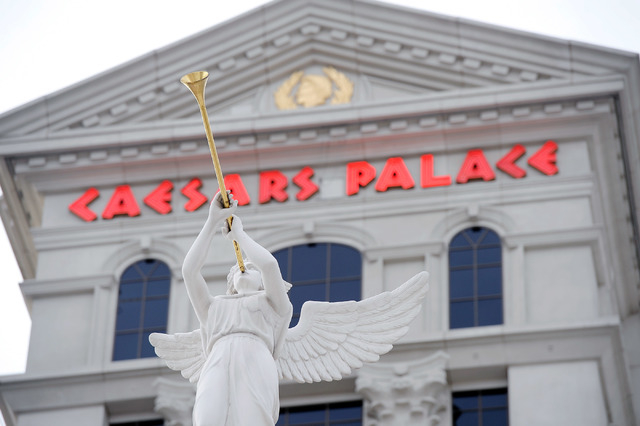Caesars Entertainment Corp., affiliate to merge; shares rise
It was always an option for Caesars Entertainment Corp. to merge with the Caesars Acquisition Co. affiliate it shed in 2013 to ease its debt burden.
But it wasn’t until last week’s affirmation that Caesars Entertainment Operating Co. would file for Chapter 11 bankruptcy protection in mid-January that action was set in motion.
Caesars Entertainment, which operates nine resorts and two major attractions in Las Vegas and whose CEOC unit carries an $18.4 billion debt, will be in a better position to manage the crushing debt as a result of the merger announced on Monday after it negotiated terms with Caesars Acquisition on Friday.
It’s an all-stock deal that will trim Caesars Entertainment Operating Co.’s debt to a more manageable $8.6 billion.
The merger not only would enable Caesars to reorganize without accumulating additional debt, but it would simplify its corporate structure and make the company more manageable.
The deal will leave the merged company with a value of $3.2 billion and provide it $1.7 billion in cash that would be used for the reorganization. That means Caesars won’t have to shop for any “significant outside financing,” according to the company.
In Las Vegas, the merged company will operate Caesars Palace and own nine other casino resorts as well as The Linq and High Roller observation wheel. The merged company will also own Caesars Interactive Entertainment Inc., Harrah’s New Orleans, Harrah’s Atlantic City, Harrah’s Laughlin and Caesars Acquisition’s current equity interest in Horseshoe Baltimore, a new market that holds promise for the company. All of the company’s properties will remain tied together through the Total Rewards players’ loyalty card system.
Caesars Entertainment Chairman Gary Loveman will remain chairman and CEO through 2016. Mitch Garber, CEO of Caesars Acquisition will join Caesars’ board as vice chairman and remain CEO of Caesars Interactive Entertainment.
Investors seemed supportive with Caesars Entertainment stock closing up 11.2 percent to $15 a share while Caesars Acquisition stock closed up 3.2 percent to $9.76 a share on Monday.
Under terms of the deal, shareholders of Caesars Entertainment will hold about 62 percent of the combined company while Caesars Acquisition will have about 32 percent.
Caesars was taken private in a $30.7 billion leveraged buyout by Apollo Global Management and TPG Capital in 2008.
“A lot of people always presumed that these two independent publicly traded companies would be brought back together,” said Caesars spokesman Stephen Cohen.
“The timing of that wasn’t a part of the plan,” he said, “but it was a way to facilitate restructuring the company and to strengthen it at the same time.”
Nancy Rapoport, a law professor at the University of Nevada, Las Vegas’ Boyd Law School, said the Caesars strategy “sounds like a very artful decision.”
Rapoport is not familiar with the specifics of the Caesars bankruptcy filing plans, but said large complex bankruptcy filings have similar characteristics.
“When preparing for bankruptcy, company executives have to think about which entities are going to file, who their creditors are and what their debts are,” she said. “It’s always going to come down to what entity owes which creditor what.”
Rapoport said Caesars likely hired expert bankruptcy counsel to help map out the best way to protect the company’s assets while doing the least to disrupt the expectations of loyal customers.
In some cases, she said, companies will move with strategic timing in their actions. She said when Station Casinos filed for bankruptcy protection, it made some moves early to work with some creditors before moving to another phase to the benefit of the company.
Contact reporter Richard N. Velotta at rvelotta@reviewjournal.com or 702-477-3893. Find him on Twitter: @RickVelotta.
RELATED:
Caesars skips $225 million interest payment
Caesars weighs layoffs, but Strip might be spared
Report: Prearranged bankruptcy for key Caesars unit as soon as January
Caesars to trim nationwide workforce by less than 1 percent
Creditor walks away from restructuring talks with Caesars
Caesars gets notice of default from bond holders

















